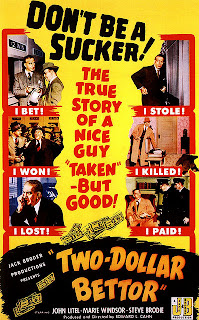Two-Dollar Bettor
My Edward L. Cahn film festival ends much later than I anticipated, as the last film (and the first chronologically), Two-Dollar Bettor from 1951, stubbornly remained the top of my Netflix queue with "Short Wait" notification. But it finally came, and it's a cheesy but interesting example of a message B-picture.
Two-Dollar Bettor is sort of the gambling version of Reefer Madness, although the film does have a point: don't bet more money than you can afford to lose. A well-respected businessman (John Litel), is invited to a day at the track. He has no interest in betting, but runs into his brother-in-law, who gives him a tip. He puts down two dollars and wins, and decides to bet on the same jockey, and wins a few more times. Soon he's making bets with a bookmaker, and starts losing.
He makes things worse by dipping into his company funds (he's the comptroller) and continues to lose. He tries to get it all back with one big bet, and thinks he's done it, but the horse is disqualified. An audit of the books looms just days ahead.
Meanwhile, a runner for the bookie (Marie Windsor), is playing Litel for a sucker and she and her grifter boyfriend hook him for another $20,000. Litel catches on and goes to get his money back, armed with a revolver.
Though this film is definitely a B-picture, it does have some quality, particularly in the use of the camera and lighting. The print is badly in need of repair, but you can still get a sense of a decent man going into a downward spiral. In some ways this reminds me of other films about degenerate gambles, most notably Owning Mahowny, which also had a man stealing from his own company.
Some of the film is laughably corny, though. Litel plays a widower with two teenage daughters, and the first part of the film is like some bad sit-com from days gone by. The girls seem to be holding a continuous dance party in the living room (one of the guests is Carl "Alfalfa" Sweitzer). Playing Litel's secretary is soon-to-be legendary TV mom Barbara Billingsley.
Though I'm sure the various horse racing associations probably didn't appreciate the film, it does have a powerful message.
Two-Dollar Bettor is sort of the gambling version of Reefer Madness, although the film does have a point: don't bet more money than you can afford to lose. A well-respected businessman (John Litel), is invited to a day at the track. He has no interest in betting, but runs into his brother-in-law, who gives him a tip. He puts down two dollars and wins, and decides to bet on the same jockey, and wins a few more times. Soon he's making bets with a bookmaker, and starts losing.
He makes things worse by dipping into his company funds (he's the comptroller) and continues to lose. He tries to get it all back with one big bet, and thinks he's done it, but the horse is disqualified. An audit of the books looms just days ahead.
Meanwhile, a runner for the bookie (Marie Windsor), is playing Litel for a sucker and she and her grifter boyfriend hook him for another $20,000. Litel catches on and goes to get his money back, armed with a revolver.
Though this film is definitely a B-picture, it does have some quality, particularly in the use of the camera and lighting. The print is badly in need of repair, but you can still get a sense of a decent man going into a downward spiral. In some ways this reminds me of other films about degenerate gambles, most notably Owning Mahowny, which also had a man stealing from his own company.
Some of the film is laughably corny, though. Litel plays a widower with two teenage daughters, and the first part of the film is like some bad sit-com from days gone by. The girls seem to be holding a continuous dance party in the living room (one of the guests is Carl "Alfalfa" Sweitzer). Playing Litel's secretary is soon-to-be legendary TV mom Barbara Billingsley.
Though I'm sure the various horse racing associations probably didn't appreciate the film, it does have a powerful message.



Comments
Post a Comment